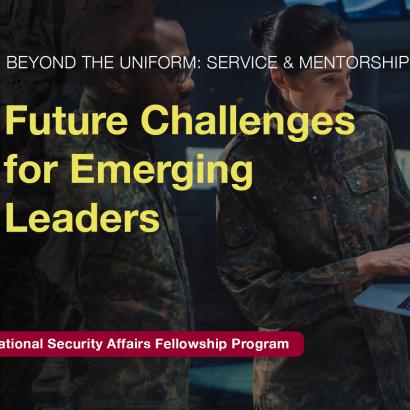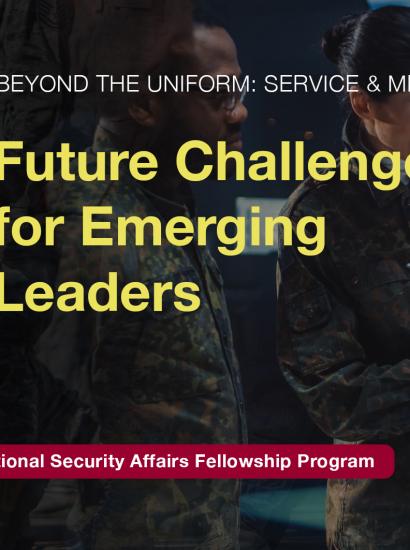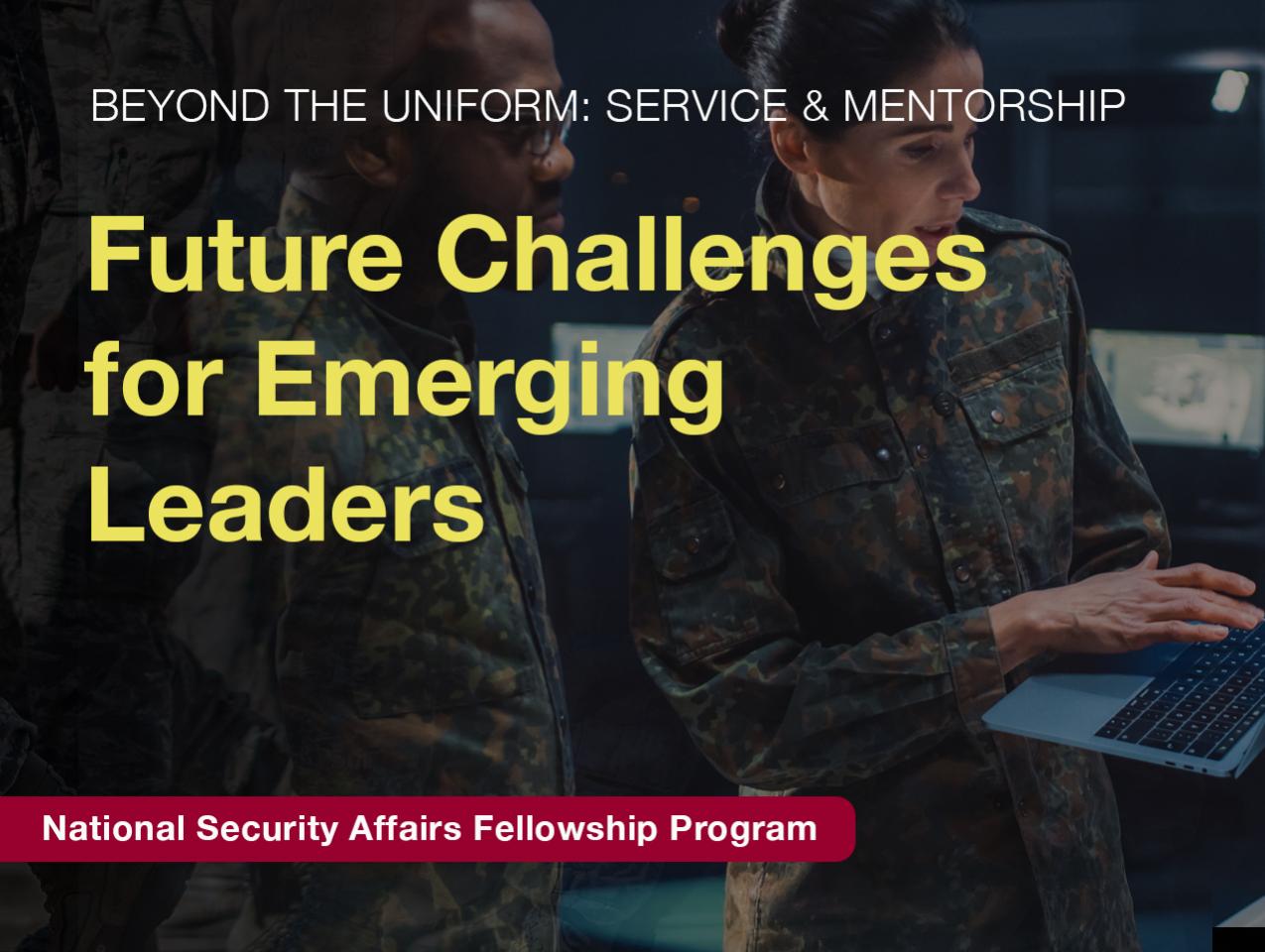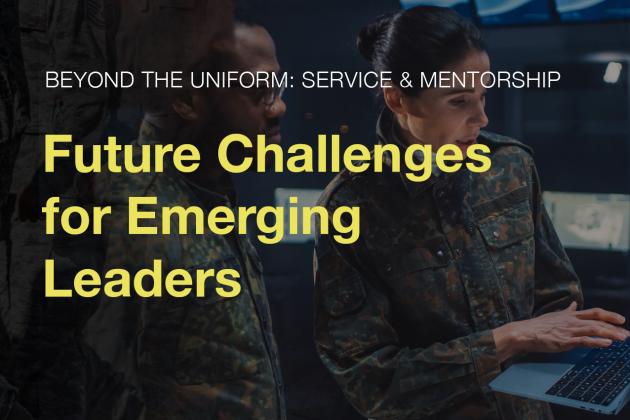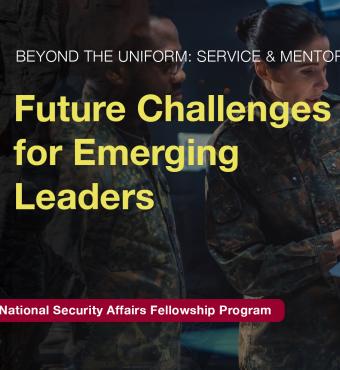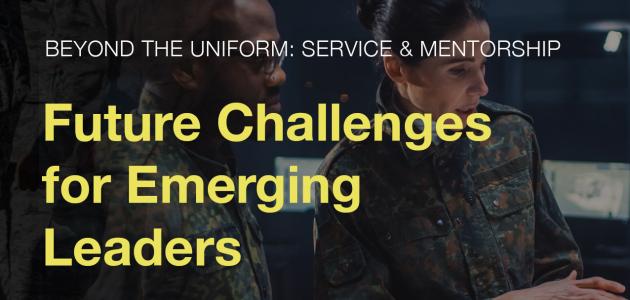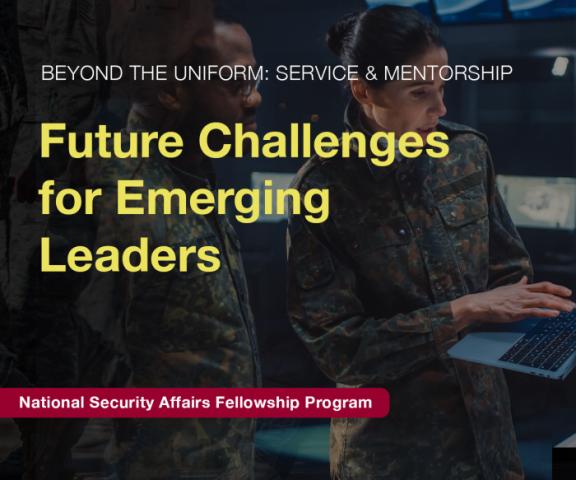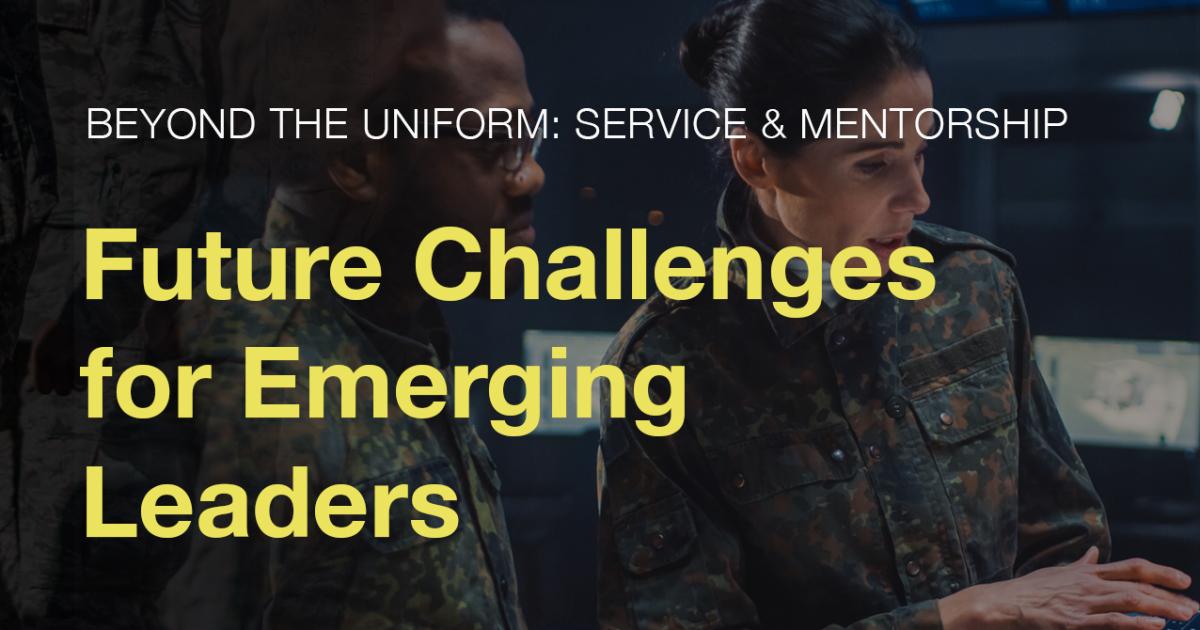In looking to the future of US leadership, Commander Justin M. Matejka (US Coast Guard) converses with Stanford University students Cayden Gu and Roome Becker about the current challenges America faces and what will be needed to pass the baton to younger generations of leaders so they can effectively address emerging challenges in the future.
WATCH THE VIDEO
>> CDR Justin M. Matejka: As a mentor in the National Security Affairs Fellowship Program, one of the most significant challenges I see facing students wanting to get involved in national security and foreign policy is developing the ability to navigate through vast amounts of information, often large amounts of noise, in a rapidly changing environment.
I think having the ability to see through that information, find clear, principled facts, grounding yourself in those facts to inform your understanding of the complex issues facing our domestic and global policy world is imperative, is an imperative or important skill to develop in order to be successful. So this program is particularly important to bridging the gap of civilian military relationships within our society.
I think today we have many Americans, no fault of their own necessarily, that have no direct relationships with the military community or service members. And I think we often take for granted what goes on in each of each other's worlds. I think it's important this program allows the opportunity for military members and other members of the government public service who do similar type roles as the military to interact with a diverse set of students who are eager to learn and are interested in our worlds.
And it gives us an opportunity to share our roles, our perspectives, our responsibilities, what it's like in our life with folks and students and mentees who wouldn't otherwise have experienced that. And I think melding it with the academic environment here at Stanford offers the ability to really cover a lot of ground in terms of personal and professional awareness of what that civil relationship looks like, especially as we blur the lines with particular political bounds, have really crossed into the civil mill relationship.
I think it's important to understand that from both sides, from both perspectives, if we wanna be successful in future policy discussions and decisions. Going into this National Security Affairs Fellows program, I'd be lying if I said I wasn't intimidated, a little bit anxious, but it was a new environment for me.
But I also knew I had an opportunity to interact with some of the brightest minds that are out there, especially here at Stanford and the student cohort. And I felt that I had an opportunity to share some of the experiences of my 20 plus years in the military with folks who were just coming on into the sphere and learning about policy and national security.
So for me, I found comfort in being able to share my perspectives, my experiences, but also in that mentorship role, learning from the students. And what I mean by that is they have different perspectives than I have being 20 plus years separated, that those perspectives will help inform my leadership moving forward.
How do I interact with this new generation that is motivated and eager to take the reins and lead America into the future, right? So there's that. And I think out of this program, I think I kind of got all of that. I was impressed by the questions, the depth, the confidence in the students over the course of the mentorship program, how some of the students came out of the shell and started asking questions that were in some cases, you can kind of say, on the edge of being maybe controversial but very pertinent to our discussions and very informative.
So I became much more, definitely more confident in the ability of the students that, especially in this program, moving forward to becoming leaders in American politics and business.
>> Roome Becker: The Hoover National Security Affairs Fellows Program. We meet every other week in a classroom setting with all of the National Security Affairs Fellows and the students normally with a topic and always followed by a story from one of the mentors, a specific story about their time in the armed forces or CIA, FBI, State Department.
And then on the weeks where we're not in class, we would attend a more informal gathering with a mentor or a group of mentors and mentees. As easy as going to get coffee or going to get lunch. And in that regard, it was really that aspect of the program.
I don't think you could undervalue in terms of, we're used to the classroom setting as being a source of value, but being able to get to know the mentors with the generational gap and with the civil military divide has been a really, really powerful thing.
>> Cayden Gu: The Hoover NSAF Mentorship Program is really a program to build relationships with senior military officials, FBI, CIA and State Department officials through weekly meetings, just getting a coffee, going out, bowling, getting a barbecue.
There's so many different activities that really brought us together. We're really able to learn about the mentors lives and all their experiences in national security affairs and really understand how they think about these issues. I think some of the most valuable experiences were just having weekly discussions after major news events and hearing their perspectives on them.
My mentor was Special Agent Nelson Layfield and he's probably the most approachable and funny person I've ever met. But he's also a serious hard worker and a true professional at his craft. I think one of the most important parts of our relationship to me was that he was a Bay Area native and a big sports fan and I was too.
And we really quickly connected on that. And one of the things I looked forward to every week was after talking through these National Security affairs issues, just going and having a quick chat about some weekly sports updates, whether it be Stanford football, the Golden State warriors or the Giants.
It was just a really great opportunity to have someone who is so easy to connect with, who is also able to share so much about his experience with me.
>> Roome Becker: My mentor is Lieutenant Colonel Dan Morabito of the Air Force. And I would say one of the greatest ways we connected was actually through his kids.
He has, I think, four children here with him, and they're reading the same books that I was reading at their age. And he brings him over to events pretty frequently. And it's been really fun because not only am I getting to know Lt Col Morabito, but to get to know his children and relate to them.
About books that I haven't thought about in ten years, mostly like 10 to 12 young adult fiction kind of books about cats taking over the world, but very fun stuff. So to get to know my mentor on a personal level has been really cool.
>> Cayden Gu: I went through basically the entire year without knowing that Special Agent Layfield was also a hostage negotiator, which I found out during one of the last story times.
And to me, it just seemed to fit him perfectly. He's just so hardworking, and he really loves his work in the FBI and how passionate he is. And I think that through his many stories about his times during the FBI that were sometimes incredibly crazy, I think I learned about a lot about who he is and how much work goes into being an effective public servant.
>> Roome Becker: I would say the thing that I found most interesting about Lt Col Mobavito, it was during his story time, he talked about what it means to be a leader. And I think that getting to know someone and not seeing them in their realm, in their world, is very different.
And so when he sat down and talked us through what it was like when he faced a crisis at work, that was really powerful. And it was also where you could see that getting to know Dan as a mentor and as a person was very different than it would have been like to get to know him in the professional setting.
And through the story, you could see how dedicated he was, not only to the Air Force as an organization, but specifically to his unit and to all the people he worked with. And so just seeing a glimpse of him, I think where he shines as a leader and as someone who cares about the people who he leads was really insightful.
Every time that I showed up to class, my mentor was always there to say hi, shake my hand, ask how I was doing. And I think one thing that we forget about, about going to university, going to college, is that in a lot of ways, you're unmoored. I didn't know anybody when I went to school.
It's my second year, so I've made some friends. But it's been really nice to have someone who every week is. I mean, it has a thought about me, it looks out for me and says, how are you doing? How's the week been? What are you thinking about? And to be able to build a relationship like that, which is unique from a quarter long class here, or even a peer level friendship, but to have someone who's older and wiser and feels almost like a family friend in that regard, our relationship, I think, was most built in that way.
And that was also what I think was most powerful. It's just to have someone who approached the relationship with a measure of care and thought and desire for me to succeed and to check in on how I was doing every week.
>> Cayden Gu: I think one of the most valuable parts of the mentorship relationship was just how Special Agent Layfield got to know me and my interest in national security and how he worked towards helping me foster those interests.
So two memories that I have are one, when I was in a class and I was looking for someone to talk to about counterintelligence, he personally took the time to go set up a meeting with one of his fellow field agents to help me get that conversation with someone currently working on those issues.
And that really inspired me a lot into learning a lot about what counterintelligence is actually like for someone who's still working at this present moment. And another experience that meant a lot to me was when Special Agent Layfield, he went to an event and he got a little pamphlet called the Defense Tech Playbook, because he knew I was getting really interested in defense tech.
And he gave me that copy and that currently still sits on my bookshelf. And it just really means a lot to me and our relationship and how we've gotten to know each other.
>> CDR Justin M. Matejka: So the most valuable aspect that I got as a mentor from the students and my mentees was really kind of bridging that gap.
And we're normal people, we have interests just like in the personal side, just in sports or music or arts or whatever it might be. And I found it fun to kind of bond on those type of activities and really kind of we're normal people. Maybe my music is a little bit older than yours, but that's just the generation thing, right?
But I think getting a glimpse into the depth of questions and curiosity. And just the eagerness to wanna participate in public service, or just being interested in it really made me proud and happy about being involved in this program. It was very fulfilling.
>> Roome Becker: One of the things that surprised me most about the program and I think has affected how I've been leading my life outside of it, is that when I heard that I was going to be involved in a program with high ranking military officials, my head immediately went to the idea of the leader as someone who's worked for 30 years and is now on top.
And I was gonna have to use my P's and Q's and bow my head and be differential and wouldn't be able to connect with these people because of their rank. And one thing that has been consistently reaffirmed to me by the mentors is that they're all one real people and also very much humble and aware of their rank in a way that I think is not put offish.
And that, I think has very much changed how I've been thinking about the world. Because to see high ranking officials who are very much humble about their power and their role and their duty and obligation to serve the country and to serve a greater good beyond themselves really makes me much more optimistic about the world and about the military, because these mentors and these people are serving something greater than themselves and they're very much humble leaders.
And to see that is powerful as a message and as a role model for us as potentially young leaders looking ahead to lead.
>> Cayden Gu: When I first heard that I was gonna have an FBI agent as my mentor, I kinda had an impression that I was gonna get someone with sunglasses on at all times, black suit, always dressed very menacingly.
But when I first started talking to Special Agent Layfield and started building that connection, I think that helped to really break down this perception that these senior military officials, these senior public servants, that they have this human quality to them that's very connectable to us, that even though we're about 20 years or so, we still have so much that we have in common with each other that we can relate on.
And I think that also seeing how they, during their time here at Stanford, continue to try to grow their horizons so much and learn so many more new things through classes, through events. I frequently ran to Special Agent Layfield at pretty random events. But that experience of just seeing how committed they were to continue to expand their horizons so that they could go back to their work, to continue to have an impact was really inspiring to me.
I think one of the first things that was really surprising to me was how important personal connections and relationships are in decision making. During one of the guest speakers, we had Secretary Mattis come in and talk to us, and he was telling us about how when he first got the job as Secretary of Defense, how he set up a meeting outside of kind of work hours with one of his counterparts to just talk through the issues on their own first before they went into a larger meeting.
And I think learning about how these government officials are going, building these relationships with each other so that they can get actual national security objectives accomplished was really interesting to me.
>> Roome Becker: One thing about the decision making process that I learned was when we had Distinguished guest speaker H.R mcMaster come speak to the class and he talked about the role of an advisor to the President as giving options and not forcing the hand of the president because we expect domain subject experts, like an advisor who represents the military to come by and say, here's what you should do.
But he talked, he said, you wanna keep the power in the hands of the decision maker and give them options, and they should try to make them equally appealing and viable options because poor advisors will try to dictate the hand of a decision maker, and good advisors let the decision maker make a decision.
And I thought that was a really interesting way of framing thinking about foreign policy and national security decision making.
>> Cayden Gu: Something that surprised me a lot came from Dr. Zieger and the importance of the collaboration between academia and policymakers and senior military officials and the private industry and how they all come together to craft policy.
I think learning about her project with the Emerging Tech Review and how they have close collaborations with the incredible CS community here. And how those kind of insights feed into our policymakers was one of the really interesting takeaways I had from this this year.
>> Roome Becker: Before I entered the program, I think I had a preconceived notion that planning implied bloat and an implied failure to act in that if you had hundreds of pages of doctrine, you would spend time reading the doctrine and not acting on it.
I couldn't really fathom that it was worth the time that people put into it. But I think that in the actual creating of policy, one of the things that I've learned from the program is that when crisis strikes, having thought about a plan is very important. My mentor has been working on, he's a cybersecurity specialist in the Air Force.
And especially for emerging technology, I think we probably have outdated doctrine, and I think my mentor would agree. But to see him thinking about and working on how we can change policy in the Air Force and I think in the military at large, especially emerging technology, even if it might be working at a slower pace than the private sector, I think the value of having thought about plans for when crisis strikes, my mentors definitely sat me down and taught me about that.
Especially in crises you've seen at work where being able to work on the fly, sure, that can work sometimes, but having doctrine and having thought about it and planned it and specified it and put policy into action before crisis strikes does have a lot of merit, especially when it comes to life or death issues.
I think the thing that surprised me most about and has changed over the course of the program and the way I think about the civilian military relationship is the way that the mentors who are high ranking military officials view themselves as one public servants. And it's very much understood and often reiterated that they are acting out policy that we as the American people vote on and choose.
And I think realizing that that's so central to the way that they think about their roles at work, that they are serving us and we are in the driver's seat, it has been really powerful because I think when I entered the program, I would have thought that the military is acting, it's kind of its own agency force and I'm protected by them, but I don't have much of a say in how they run things.
And the fact that it's constantly reiterated that no, these are people who are serving the civilians and that's the structure of the relationship. And as a citizen and as a voter, I do have a way, I do have a form of shaping military policy has been really cool.
And I think the way that I've changed my thinking on the civilian military relationship the most.
>> Cayden Gu: I think one of the biggest takeaways about civilian military relationships that I took from my personal experience is how little actually understood about how the military operates on a day to day basis at a policy level and all the components that go into it beyond just this kind of stereotype on social media that's like they just go and shoot things.
I think just learning about all the complex processes such as logistics, building out very specific policies, acquiring new technologies, has really opened my mind into how connected that the military world is actually with the civilian world and how they're not really two separate entities, but kind of like two parts of the whole that are both working together towards national security objectives.
And I think that as this next generation comes up, there's a lot of misconceptions out there that have to be addressed. So giving young people a chance to connect with real military leaders that have real experience I think is incredibly valuable. I think one of the really important things that I was learning, especially through the mentor story, is just about taking initiative and when you see something that has a need going out and giving it everything you have to get that need done.
I think one of the most interesting stories I heard this quarter was about Mr. Goldrup and how he helped to coordinate President Bush's visit to attending a church service in Beijing during the 2008 Olympics. And how even though this wasn't something that was like this needs to happen, he thought that this would be something that the President would want, that would be good for developing relationships with China.
And I think that how he went through that process, even though it took so much turmoil and took so much coordination, how he was willing and dedicated to do it to achieve a greater mission.
>> Roome Becker: The way I think about leadership in the military has definitely changed. And I think one symbol of that is the way that because of the progression of rank in the military, you start as an officer and you work your way up over the course of 20 years.
And so much of the leadership is built not necessarily as a leader of a massive organization from the beginning, but as a leader of a few soldiers, and then that number continuously grows. And so it's as a manager of people in a way that I kind of forgot about before it becomes as a manager of an organization in the abstract.
And so, so many of the mentors, first and foremost, are managerial and are people focused. And I think they're also mission focused because they had to work the way up a ladder in a way that we are not seeing as much on the corporate side or on the private side in the private sector, to stay in one company for 20 years.
And therefore, to have served in all these different roles definitely creates a different kind of leader than I think you would see in the private sector.
>> Cayden Gu: Coming into this year, I thought that I was gonna start full sending it into kind of the CS track, learning just really technical issues so that I could go out, get a job, that kind of thing.
But I think going through this program and understanding the value of service and how building a strong United States and upholding our values and really working towards national security is in a whole society effort that wherever you are, in whatever capacity are in. You have the ability to serve.
And I think that that thought has kind of guided me towards wanting to do more policy related issues and wanting to use whatever skills that I'm developing here at Stanford towards serving American national security interests, whether that be through defense tech, which I've been really interested in, or just through service in any other capacity.
I think the biggest takeaway from this year has been that anyone can serve and you do have the ability to do so.
>> Roome Becker: I think the ways that this program has shaped me professionally or academically are twofold and one, that it's after each class I have left so inspired, I think to see the mentors and to talk about something that is clearly so purpose driven and purpose oriented has been really powerful.
Because when we get caught up in our selfish desires about what we want our career to be, or when you think of it as just a me issue, it's very different than when we start thinking about one, issues in the abstract and two, something that clearly has benefit to all of us.
And so I would say that at least academically this program has helped me a lot because every Thursday after at 4:30, I've walked out of there with newfound vigor and energy which I've used to attack all my classes. And I think that has been really, really cool. And then I think the second way that the program has shaped me academically is that it's reaffirmed the importance or at least it's reaffirmed my belief that what I'm studying is important and that's electrical engineering.
Because to see that one of the things that both the mentors and the mentees are most scared about national security wise, is technology. Technology is kind of a black box. Nobody really understands it. It's difficult to understand in the abstract. And those in the cutting edge aren't often thinking about national security.
They're thinking about their technology. And so I think it has been really, really cool to see that clearly there is a need for students who want to learn about emerging technologies and are also interested in the national security bigger picture and especially the synergy there. Definitely when I've been in the library, late night has been a thing, I've been thinking about that.
No, I am needed, I do need to do this. It is important that I study this and I think it's important that other students choose to study it as well.
>> CDR Justin M. Matejka: Based on my participation within this mentorship program with the Stanford students, I remain very confident in the future of American security in their hands.
I was impressed by the eagerness to learn the curiosity, just the relentless pursuit of finding answers and being interested in public policy, governmental affairs, and what makes the national security and decision making cycle work. So I remain very confident in the future of our students as they move into the world and take the reins of the national security policy framework.
Yeah, so coming into this program as a mentor with a larger age gap, I was somewhat nervous of not being able to either relate or find ways of breaking through and having meaningful conversation. I didn't wanna be the old guy with these old stories. So I was very impressed.
I don't know if when I was the mentee's age that I necessarily may have been open to this interaction or had as much curiosity in this world. Even though I went to a military academy, I don't know if I had as much desire to learn about it. But I'm impressed that at this young age, these students have such an eager interest in learning about public policy, whereas I don't know if I had that same sense of urgency or desire at the time.
I was really most curious about learning about engineering in my technical field vice trying to broaden myself in my undergrad studies. So for that, the students have certainly impressed me with their resolve. I think I've tried to over the course of my career broaden my experiences, whether it's going international, getting involved with learning about State Department international affairs, or in my most recent assignment to legislative affairs, working on Capitol Hill.
I've tried to broaden my own skill sets. And I think to my mentees and students, I've tried to take some of that insider knowledge that I've learned working in those fields, especially as an outsider, right? So we have somebody from Department of State who has their perspective but I was an outsider that went into the Department of State.
I was an outsider who went into work in legislative affairs, so I got a different perspective. And hopefully, I think as I portrayed some of my stories to the students and the mentees, I hope that that kind of shed some light and maybe built some confidence in the ability of, you may not be in it, but even as an outsider, you can come into a world and you can learn and be successful in moving policy.
>> Roome Becker: My favorite part of the program has consistently been the stories that the mentors share at the end of every class. We set aside 30 minutes for them to share a story about from their career, and they have a few months to think about it and pick one.
And it's been consistently, they've been incredible stories. And to think that oftentimes it's taken a year consistently weekly engaging with the mentors. When they're given a formal setting, do you finally get to hear this impactful and incredible story from their career. And I think that there's a real gap in the knowledge that you can gain from someone in these kind of informal settings.
And to set aside and give these mentors a podium to really share a full, long story, it's been really, really cool. And it's the way that I've learned the most about each of the mentors, often as people and in their careers. And I guess, one of the lessons that I'm gonna take away from the program is how powerful it is to really give someone the soapbox and let them share an impactful story about their lives for more than five minutes or more than two minutes and be able to share in a different setting.
ABOUT THE FELLOW & MENTEE
Commander Justin Matejka, national security affairs fellow at the Hoover Institution for the 2024–25 academic year, is an afloat officer who has conducted search-and-rescue, counterdrug, maritime migrant interdiction, and defense operations across the Western and Eastern Hemispheres over a nineteen-year career. He recently served as the Coast Guard’s liaison to the US Senate.
Cayden Gu is a sophomore at Stanford University studying Computer Science and History. His academic and extracurricular interests include defense technology, robotics, national security, and photography.
Roome Becker is a rising Junior in the Class of 2027, majoring in Electrical Engineering. On campus, he is involved with Student Government and Sketch Comedy with real interest in international affairs.







